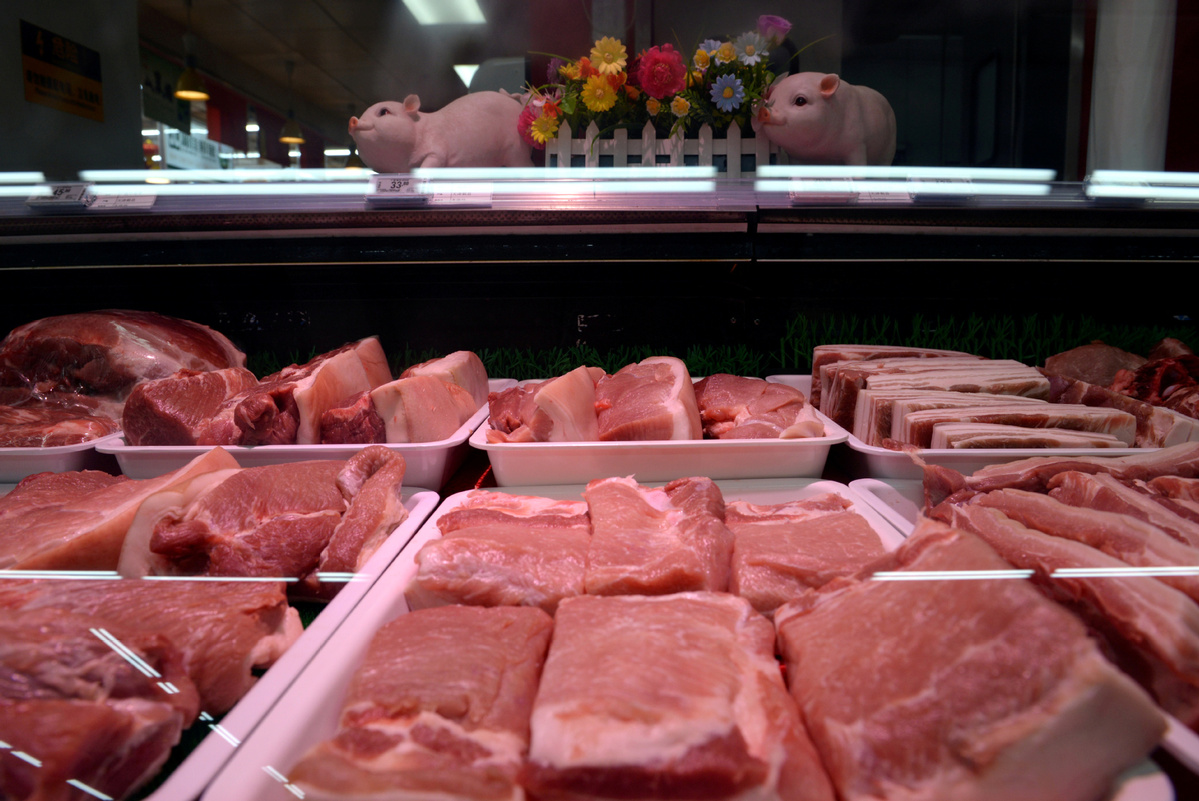Meat-and-greet: Plant-based pork debuts at electronics show


Tariffs and African swine fever made 2019 a bad year for Chinese pork consumers, cutting supply and driving up prices as tens of millions of hogs in Asia were slaughtered in an effort to halt the spread of the disease.
Impossible Foods, based in California, on Tuesday offered what may be part of the solution to tight supplies in an incongruous setting: A plant-based pork substitute was introduced at the Consumer Electronics Show in Las Vegas. It has received mixed reactions from vegetarians and meat-eaters, who were divided on its texture and taste.
The move, playing out against China's planned release of an additional 20,000 tons of frozen pork from state reserves this week in the run-up to the Lunar New Year celebration, may be a harbinger of the future — even if a comprehensive US-China trade deal is completed.
"In its current form, the meat industry is unsustainable," Michael Dent said in a research report for IDTechEx. "It is an inefficient way to produce food that may soon be unable to adequately feed the growing global population, which could reach 10 billion by the year 2050. Meat production is damaging to the environment, too."
Worldwide, meat sales totaled an estimated $1.4 trillion in 2019. China is the largest market, and 62.4 million tons of meat were consumed in 2019. The US was a distant second at 21.1 million tons, Euromonitor International reported.
The US Department of Agriculture said pork is the world's most widely consumed meat, but African swine flu cut global production by an estimated 10 percent, and Chinese production fell about 25 percent 2019.
But demand remains strong. Global production is expected to increase 1 percent this year and US production 4 percent.
Restaurant owners report strong interest in vegetable-based protein products even though African swine fever poses no threat to humans.
Herds of hogs may eat soybeans by the ton, but new companies such as Impossible Foods and Beyond Meat devour money as they seek to develop new products and bring them to market.
Impossible Foods is backed by venture capital companies Khosla Venture and Horizons Ventures as well as tennis star Serena Williams and singer Katy Perry. It's raised about $777 million in the private market, PitchBook reported.
Wall Street won its first big bet on the plant-based meat substitute industry. Last May, Beyond Meat's IPO was priced at $25 a share. The stock opened at $46 and ended its first day of trading at $65.75 — a gain of 163 percent.
The stock later soared to $239.71 a share — a gain of about 859 percent from the offer price — and recently fetched $76.71, up $2.85 in intraday trading.
However, Beyond Meat is still building its market and continues to lose money despite strong sales growth.
In a research report, Barclays said sales of alternative meat could grab about 10 percent of the global meat industry, and sales could total $140 billion in the coming decade.
The introduction of vegetable-based breakfast sausage and ground pork are the first products mimicking non-beef protein offered by Impossible Foods since it launched a hamburger substitute in 2016.
The company has not yet announced plans for an IPO, but market watchers believe it may come this year.
The company's Impossible Sausage will be available at 139 Burger King fast-food restaurants by the end of January as part of the chain's "Croissan'wich" breakfast.
Impossible Foods didn't announce a release date for its ground pork. Rival Beyond Meat last year sold plant-based sausage to Dunkin Brands Group, Carl's Jr and Tim Horton's restaurants.
Strong sales haven't gone unnoticed by livestock producers who have urged regulators to prohibit the use of words like "pork" and "meat" to characterize plant-based products, fearing consumers will be misled. Impossible's product is labeled "pork made from plants" but strong sales suggest consumers like choices, and many want an alternative to animal meat.
Plant-based meat substitutes are generally more expensive than animal meat, but that may change as companies like Impossible Foods and Beyond Meat increase production, and sales grow.
"The current pork shortage has exposed the inherent vulnerability of a supply chain dependent on animals and has created a gap that the next generation of plant-based pork is perfectly poised to fill," Caroline Bushnell, associate director at the Washington-based Good Food Institute, said in a report. "The market is ripe for plant-based pork that will satisfy omnivores."
The advocacy group said it works with scientists, investors and entrepreneurs to make new types of food a reality. It said sales of pork alternatives in the US increased 15 percent in the 12 months ended in April 2019.
Fast-food restaurants appear to be a good way to introduce consumers to vegetable-based meat alternatives, especially as some look for alternatives to beef. Manufacturers pitch the products to the general consumer and urge supermarkets to place them with animal meat products because vegetarians represent less than 5 percent of current sales.
In a conference call with Wall Street analysts to discuss third-quarter earnings, Dunkin' CEO David Hoffman said, "We were very pleased how it performed in Manhattan." He said many customers purchased Beyond Sausage more than once.
Next up for plant-based food companies: chicken, fish, including salmon substitutes, and shellfish, including shrimp.
"Just as modern automobiles replaced the horse and buggy, better alternatives will replace conventional animal agriculture," the Good Food Institute's Bushnell believes.
Today's Top News
- Chinese New Year of the Horse Luncheon held in Muscatine, strengthening China-US friendship
- Year of the Horse carries message of resilience, solidarity, industriousness
- China remains anchor of stability in unsettled world
- Stage beckons, festive spirit resonates overseas
- China predicts over 285 million inter-regional trips on first day of Spring Festival holiday
- China extends visa-free policy to Canada, UK






























